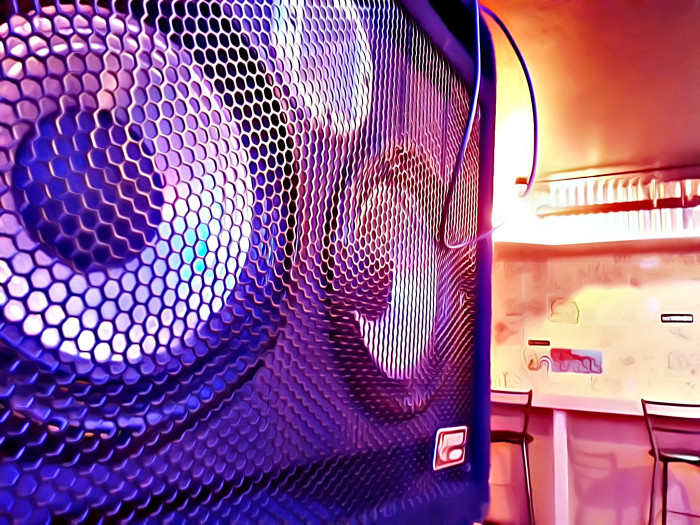Stop agonizing and just go with post to start.
Please Remember:
The opinions expressed are mine only. These opinions do not necessarily reflect anybody else’s opinions. I do not own, operate, manage, or represent any band, venue, or company that I talk about, unless explicitly noted.

 Want to use this image for something else? Great! Click it for the link to a high-res or resolution-independent version.
Want to use this image for something else? Great! Click it for the link to a high-res or resolution-independent version.Oh, the hand-wringing.
Should the audio-human take the pre-EQ split from the amplifier, or the post-EQ split? Isn’t there more control if we choose pre-EQ? If we choose incorrectly, will we ruin the show? HELP!
Actually, I shouldn’t be so dismissive. Shows are important to people – very important, actually – and so taking some time to chew on the many and various decisions involved is a sign of respect and maturity. If you’re actually stopping to think about this, “good on ya.”
What I will not stop rolling my eyes at, though, are live-sound techs who get their underwear mis-configured over not getting a pre-EQ feed from the bass/ keys/ guitar/ whatever. Folks, let’s take a breath. Getting a post-EQ signal is generally unlikely to sink any metaphorical ship, sailboat, or inflatable canoe that we happen to be paddling. In fact, I would say that we should tend to PREFER a post-EQ direct line. Really.
First of all, if this terminology sounds mysterious, it really isn’t. You almost certainly know that “pre” means “before” and “post” means “after.” If you’re deducing, then, that setting a line-out to “pre-EQ” gets you a signal from before the EQ happens, then you’re right. You’re also right in thinking that post-EQ splits happen after all the EQ tweaking has been applied to the signal.
And I think we should generally be comfortable with, and even gravitate toward getting our feed to the console from a point which has the EQ applied.
1) It’s consistent with lots of other things we do. Have you ever mic’ed a guitar amp? A drum? A vocalist? Of course you have. In all of those cases (and many others), you are effectively getting a post-EQ signal. Whether the tone controls are electronic, related to tuning, or just part of how someone sings, you are still subject to how those tonal choices are playing out. So, why are you willing to cut people the slack to make choices that affect your signal when it’s a mic that’s involved, but not a direct line?
2) There’s no reason to be afraid of letting people dial up an overall sound that they want. In fact, if it makes it easier on you, the audio-human, why would that be a bad thing? I’ve been in situations where a player was trying desperately to get their monitor mix to sound right, but was having to fight with an unfamiliar set of tone controls (a parametric EQ) through an engineer. It very well might have gone much faster to just have given the musician a good amount of level through their send, and then let them turn their own rig’s knobs until they felt happy. You can do that with a post-EQ line.
3) Along the same track, what if the player changes their EQ from song to song? What if there are FX going in and out that appear at the post-EQ split, but not from the pre-EQ option? Why throw all that work out the window, just to have “more control” at the console? That sounds like a huge waste of time and effort to me.
4) In any venue of even somewhat reasonable size, having pre-EQ control over the sound from an amplifier doesn’t mean as much as you think it might. If the player does call up a completely horrific, pants-wettingly terrible tone, the chances are that the amplifier is going to be making a LOT of that odious racket anyway. If the music is even somewhat loud, using your sweetly-tweaked, pre-EQ signal to blast over the caterwauling will just be overwhelming to the audience.
Ladies and gents, as I say over and over, we don’t have to fix everything – especially not by default. If we have the option, let’s trust the musicians and go post-EQ as our first attempt. If things turn out badly, toggling the switch takes seconds. (And even taking the other option might not be enough to fix things, so take some deep breaths.) If things go well, we get to ride the momentum of what the players are doing instead of swimming upstream. I say that’s a win.